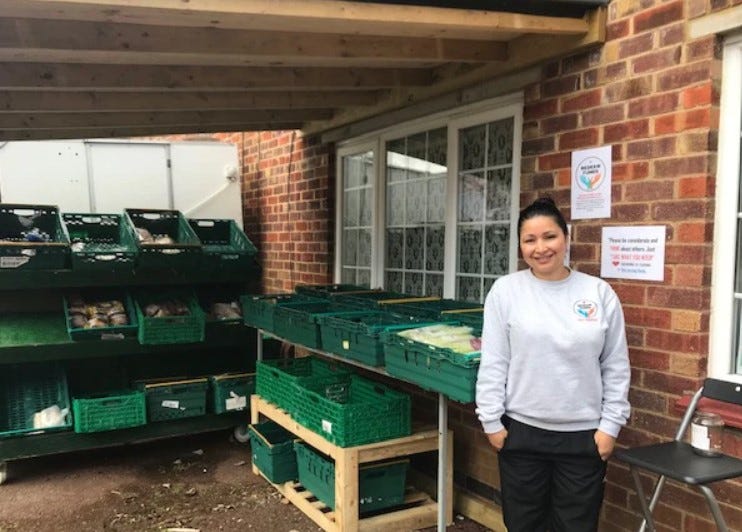‘If we can’t continue, people will go without food’
The cost of living crisis is creating a perfect storm for food banks
Receive our regular news by adding yourself to our mailing list here
By Natalie Bloomer
When Mary Roka Magar set up Redeem Funds in 2020 her intention was to help families who were struggling for food during lockdown. Today she is feeding 30 - 35 families every week in the Queensway area of Wellingborough but is worried that before long she won’t be able to continue.
“Without support it’s not sustainable. We are lucky that we receive fresh produce from FairShare but we have to purchase all the tinned and long life products ourselves and we have to pay for the fuel to collect the FairShare items which is often from places like Milton Keynes, Rushden or Bedford.”
Four days a week Mary and her volunteers pile up crates of food on her front driveway in Cowper Road for people to come and take. She says in recent weeks she has seen new families who are telling her the cost of living crisis is forcing them to choose between feeding themselves or paying bills.
“They are saying, ‘we don’t know what to pay first, if we buy food we can’t pay the electric bill’ lots are living in their overdrafts and really struggling.
“I went on holiday recently so had to tell people that our usual service would not be operating but we left emergency food packages at St Mark's Church in case people were desperate. I was getting text messages asking me ‘Mary when are you coming back?’ because they had run out of food. I got back at 11pm on a Thursday night and had to open up for families first thing Friday morning because they needed help.”
It is not just those in need of food who are being hit by rising costs but food aid organisations themselves. An email circulated to voluntary groups in Kettering last week warned that food banks in the area are facing a ‘perfect storm’ with demand for food exceeding the donations. The email said:
“They [food banks] are using their reserves to purchase food which is an unsustainable position! We have together written a letter to our MP and local councils highlighting this situation and seeking support in raising additional government funding.”
Inflation has now reached nine per cent, the highest level since 1982, however for those on the lowest incomes the level is thought to be 10.9 per cent due to them spending a higher percentage of their household budget on gas and electricity compared to the richest households.
Research economist at the Institute for Fiscal Studies Heidi Karjalainen explains:
"Because so much of the increase was driven by the increase in the gas and electricity tariff cap, poorer households who spend more of their budgets on gas and electricity, faced an even higher rate of inflation. We estimate that the poorest 10 per cent of households faced an inflation rate of 10.9 per cent. State benefits only increased by 3.1 per cent in April. This means big real terms cuts to the living standards of many of the poorest households.
"Continuing pressures, such as the war in Ukraine, are likely to push Ofgem’s October tariff cap, as well as other prices including food prices, even higher later this year. We are likely to be in a prolonged period during which poorer households are facing rates of inflation even higher than the headline figures would suggest."
The Independent Food Aid Network (IFAN) which represents more than 550 independent food banks across the UK wrote to the chancellor last month to urge him to “take immediate action to reduce the rapidly rising levels of poverty, destitution, and hunger in our communities”. The letter said:
“We are deeply concerned about the scale of suffering that we are already witnessing as well as our capacity to prevent people from going hungry in the weeks and months to come. An emergency supply of food cannot resolve someone’s financial crisis and will only act as a temporary sticking plaster.
“…Charitable food aid has been an inadequate and unsustainable stop gap measure to growing poverty in the UK for 12 years. We urge you to immediately address the root causes of the poverty driving the need for our services. Food banks are reaching breaking point.”
The government points to a range of measures it has put in place to help ease the crisis including a council tax rebate to help with energy costs, an increase to the minimum wage and an increase of Universal Credit. But many MPs, including within the Conservative Party, are calling for more to be done.
As for Mary in Wellingborough, she says it’s getting harder and harder for her organisation to cover the rising costs.
“We’re really struggling. We recently applied for a North Northamptonshire Council community grant but were told we don’t fit the criteria, we don’t know why that is - we think feeding people is important! If we can’t continue to do what we are doing, people will go without food, I’m certain of that.”





The factor that no one comments on is the ludicrous cost of renting, probably made worse by low interest rates pushing up the cost and scarcity of housing to buy, and the reemergence of the rentier class. Add to that the non-replacement of stock by Right-To-Buy